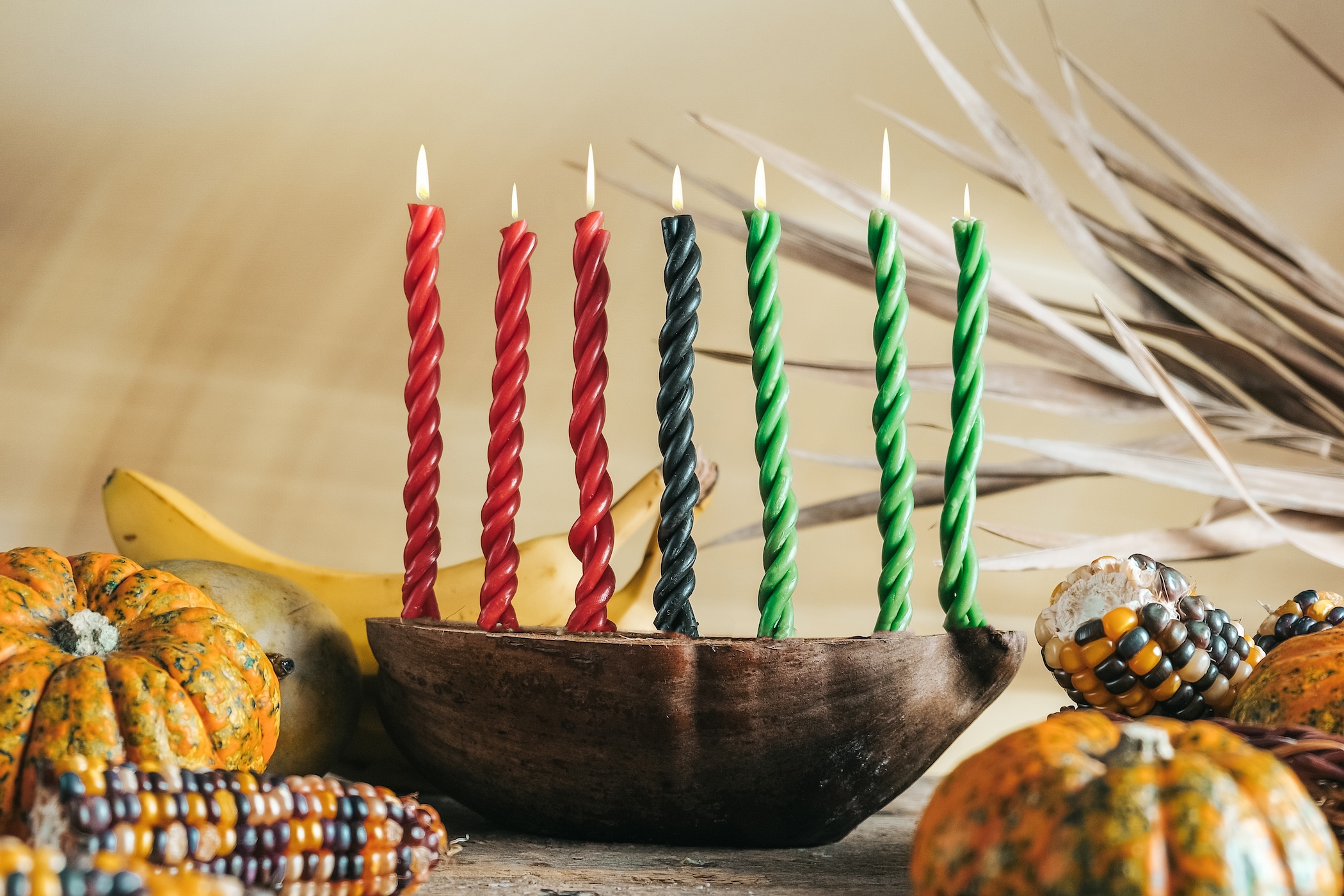This December, the Heersink School of Medicine Office of Access & Engagement sought to connect with the medical community by learning about the season’s rich variety of holidays. In part two of our holiday series, we explore Kwanzaa, a weeklong celebration of African heritage, community values, and cultural reflection.
To better understand the holiday’s significance, we spoke with Kim Ayers, nurse manager at the UAB Center for Psychiatric Medicine, who shared how Kwanzaa’s principles inspire her approach to health care and community building.
Where it all began
Kwanzaa was created in 1966 by Maulana Karenga, Ph.D., a professor and activist, during the civil rights movement. Rooted in African traditions, it was designed to honor African heritage while promoting unity, pride, and cultural identity among African Americans.
The name “Kwanzaa” comes from the Swahili phrase matunda ya kwanza, meaning “first fruits,” referring to harvest celebrations in African cultures. Observed from Dec. 26 to Jan. 1, Kwanzaa culminates in a communal feast called Karamu. Each day focuses on one of the seven guiding principles, the Nguzo Saba: The kinara, a symbol of Kwanzaa’s seven principles
The kinara, a symbol of Kwanzaa’s seven principles
-
Umoja (Unity)
-
Kujichagulia (Self-determination)
-
Ujima (Collective work and responsibility)
-
Ujamaa (Cooperative economics)
-
Nia (Purpose)
-
Kuumba (Creativity)
-
Imani (Faith)
Each evening, a candle is lit on the kinara (a seven-candle holder), and families reflect on how that principle can guide their actions and interactions.
While Kwanzaa is not a religious holiday, its values—focused on self-reflection, community, and shared responsibility—offer universal lessons that resonate across cultures and professions, including health care.
Connecting Kwanzaa to medicine
The principles of Kwanzaa align closely with the values of health care, particularly in mental health and community wellness. Ayers incorporates Kwanzaa’s principles into her work, emphasizing how unity, purpose, and collective responsibility shape her efforts to support patients and promote mental health awareness in the Black community.
Umoja (unity) and ujima (collective work and responsibility) are central to Ayers’ mission of addressing the stigma around mental health.
Ayers says, “With mental health, Black folks are historically not interested in going to see a psychiatrist. That kind of thing is generally not talked about. It’s a little better now, but there’s still a stigma of ‘don’t tell people your business.’ The community has been more outspoken about the importance of mental health and taking care of it, and I’m very outspoken about it, too—not just in my family or at work, but everywhere. It’s part of who I am.”
For Ayers, nia (purpose) serves as a foundation for overcoming challenges in her career.
“I’ve had to step back and realize I’m here for a purpose,” she reflects. “There’s a reason I’m in this field, and there’s a reason I’m in this position. It wasn’t easy—30 years ago, I was young and in charge of people older than me who didn’t look like me and didn’t respect me initially. I had to earn that respect. But knowing my purpose and why I’m here kept me grounded.”
Ayers also uses Kwanzaa’s principles to educate and empower patients, staff, and the broader community.
“Without being informed [about Kwanzaa], without having the knowledge, I wouldn’t be able to do what I do,” she says. “It’s helped me progress and move forward, but also to help educate my patients, my staff, and my community. Sharing that knowledge is so important.”
Beyond the clinical setting, Ayers draws on imani (faith) and kuumba (creativity) in her role as a yoga instructor, offering classes to help people manage anxiety and stress.
“Yoga helped me so much during stressful times,” she shares. “So I said, let me become a teacher to help others with that. I’ve incorporated that into my life big time, and Kwanzaa has been a foundational tool that helped me do that.”
For Ayers, Kwanzaa’s principles are more than ideals—they are practical guides for patient care, professional resilience, and community leadership.
Fond memories and celebrations
Although Ayers didn’t grow up celebrating Kwanzaa, she embraced it over 25 years ago as a way to reconnect with her heritage and instill a sense of pride and purpose in her family. Ayers celebrating with the Birmingham Kwanzaa Committee
Ayers celebrating with the Birmingham Kwanzaa Committee
“I felt that it was important that they understood our history, culture, and contributions to society,” she explains.
Incorporating Kwanzaa’s rituals into her family life created meaningful opportunities for bonding and reflection. Each evening during Kwanzaa, her family gathers to light the kinara and discuss how each principle applies to their lives.
Ayers fondly remembers introducing her children to the holiday’s customs, from learning the Swahili terms for the principles to experiencing the joy of traditional African attire and celebrations.
“Over time, they’ve come to appreciate it,” Ayers says. “Now, it’s something they’re proud of.”
Beyond her family, Ayers finds deep connection through the Birmingham Kwanzaa Committee, which hosts nightly events featuring music, dancing, and shared meals.
“The people I started celebrating with are still around,” she says. “We continue to meet every year, and that’s one of the most meaningful parts of Kwanzaa—developing relationships and witnessing the strength of our community.”
Embracing Kwanzaa's universal principles
Although Kwanzaa is rooted in African heritage, its principles—unity, purpose, faith, and creativity—offer lessons for all. Ayers encourages anyone curious about Kwanzaa to learn more.
“Learn about the principles, what they mean, and what they stand for,” she says. “Attend community events if you can—groups like the Birmingham Kwanzaa Committee provide wonderful opportunities to connect and celebrate.”
Ayers believes Kwanzaa’s emphasis on reflection and community can inspire resilience and renewal, not just during the holiday season but throughout the year.
Stay tuned for part three of our holiday series, where the Heersink School of Medicine Office of Access & Engagement will explore the historical significance and traditions of Christmas.